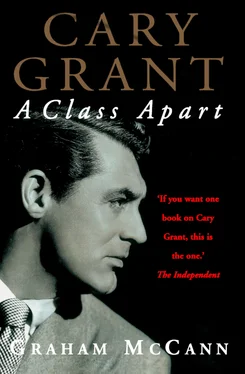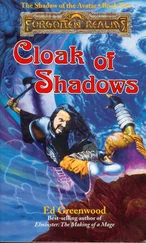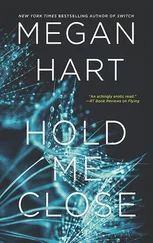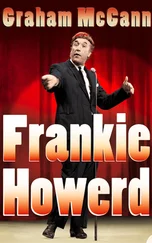Behind the construction of his character is his working-class background. That’s what makes him interesting. That’s what makes him liked by the public. He’s close to them. He’s not an aristocrat. He’s not a bourgeois. He’s a man of his people. He is a man of the street pretending to be Cary Grant! 63
It was one of the most admirable achievements of Cary Grant: that he never had, or wished, to renounce his past in order to embrace his future. Unlike those stars who seemed ashamed of, or embarrassed by, their humble origins, Cary Grant seemed content to stand upon his singularity; it would, for example, have taken a reckless person to risk calling Rex Harrison ‘Reg’ to his face, but Cary Grant delighted in slipping references to his former name into his movie dialogue – such as the ad-libbed line in His Girl Friday (1940): ‘Listen, the last man who said that to me was Archie Leach just a week before he cut his throat.’ 64 It was a knowing wink to the audience, his audience, a secret shared with strangers; it was the kind of gesture that would have endeared someone like Cary Grant to someone like Archie Leach.
Archie Leach did not cease to exist when Cary Grant was created. ‘Cary Grant’ was just a name, a cluster of idealised qualities. Cary Grant became something other than the sum of his influences, and he preserved more than it might have appeared from his own personal history in that charismatic conformation. Cary Grant was not conceived of as the contradiction of Archie Leach, but rather as the constitution of his desires. If Cary Grant succeeded, Archie Leach, more than anyone else, more than any other influence or ingredient, would be responsible. Cary Grant would always appreciate that fact. Fifty years after he changed his name, when he was the subject of a special tribute, 65 he requested that the cover of the programme for the occasion should feature a photograph of himself at the age of five – signed by ‘Archie Leach’.
Since I was tall, had black hair and white teeth, which I polished daily,I had all the semblance of what in those days was considered a leadingman. I played in the kind of film where one was always polite andperfectly attired .
CARY GRANT
You must not forget who you are …
FEDORA
It was an anxious Cary Grant who reported to work for the first time at Paramount. Archie Leach had a new name, but he had yet to make a new reputation. Here he was at the studio of Marlene Dietrich, Gary Cooper, Maurice Chevalier, Fredric March, the Marx Brothers, W. C. Fields, Claudette Colbert, Tallulah Bankhead, Miriam Hopkins, Sylvia Sidney, Carole Lombard and Harold Lloyd – big stars, experienced performers. The only person with whom Archie Leach was acquainted was Jeanette MacDonald, but her option had not been renewed and she was leaving the studio. Cary Grant was on his own.
If Cary Grant was intimidated by his new surroundings, he was not disheartened. Jean Dalrymple, who had given Archie Leach his first paid speaking role in vaudeville, recalled:
I had lunch with him at the Algonquin just before he went to California. He was so excited. He felt it was his great opportunity. I remember telling him not to get stuck in California but to come back to the theater from time to time.
I didn’t know he was going to be a sensational hit. He didn’t always have that marvelous, debonair personality. He was often very quiet and reserved. But when he got in front of a camera, his eyes sparkled and he was full of life. The camera loved him. 1
Cary Grant’s Hollywood was the Hollywood of the thirties. The effects of the Wall Street Crash were still being felt, and yet memories of the event, which had hit movie-makers in the West as well as more conventional businessmen in the East, were already – for some – receding. Audiences were still visiting America’s vast rococo and Moorish picture palaces, those strangely aristocratic arenas of the new democratic art where visitors were greeted with an anxious show of opulence – fountains and waterfalls, painted peacocks and doves, huge mirrors and grand arcades, thick carpeting and air-conditioning, all designed to project, for a few hours, an illusion of prosperity. If it seemed to the weary, depression-ridden citizen that the American dream could not be lived, then Hollywood studios worked hard to remind people that it could still be imagined. ‘There’s a Paramount Picture probably around the corner’, the studio told Saturday Evening Post readers. ‘See it and you’ll be out of yourself, living someone else’s life … You’ll find a new viewpoint. And tomorrow you’ll work … not merely worry.’ 2 It was a relatively successful strategy. In the midst of the Great Depression, audiences were still exhibiting what in the circumstances appeared a remarkable appetite for the products of Hollywood. In the first half of the decade, however, Paramount, ruled by Adolph Zukor, lacked the rock-like business stability of, for example, Metro-Goldwyn-Mayer, and the profit or loss incurred by one movie tended to affect unduly the studio’s financial climate. 3 In the year that Cary Grant joined the studio, Paramount had made a sixteen-million-dollar loss, with possible bankruptcy ensuing.
Paramount – not surprisingly – had no intention of starting Cary Grant in important leading roles, but he would have more than enough opportunities to attract the attention of movie audiences. The company (after a policy of wild and rashly overoptimistic expansion during the second half of the 1920s) owned the largest circuit of theatres in the world, which it kept supplied by producing around sixty feature films per year. Operating on increasingly strict factory lines, it completed and shipped at least one new movie every week, so there was always a place for a new contractee somewhere along the assembly line. As a newcomer, Cary Grant was expected to work extremely hard for his $450 a week. He was there, without doubt, to do what he was told. It was a six-day schedule, Monday to Saturday, with no extra pay for overtime (which was common). The bare statistics of his first year with the studio reflect the production-line smoothness of the times: he made seven movies in 1932, working a full fifty-two weeks.
During Grant’s first few hectic weeks at the studio he found a supporter in Jack Haley, the comedian, who later achieved his greatest Hollywood success in the role of the Tin Man in The Wizard of Oz (1939). As his son, Jack Haley, Jnr., remembers, Grant was grateful to know someone else who had made the transition from vaudeville to movies:
When Cary was first at Paramount, he made a bee-line for my father, who had already done six or seven pictures there … Cary wanted to know what making movies was all about. My father told him, ‘The first thing you learn is not to use your stage makeup. So find a good makeup person. And don’t talk to the leading actress. She’ll steer you wrong. She’s your competition. Talk to the character people. They’ll teach you the ins and outs.’
Cary loved Charlie Ruggles, Arthur Treacher, and all those character people who came from Broadway or vaudeville. He felt secure with them. Years later Cary told me, ‘Your father was the only one who gave me advice for my first picture’. 4
Grant first appeared, billed fifth, in Frank Tuttle’s farce This is the Night . Playing the supporting role of an Olympic javelin thrower whose wife is having an affair with a millionaire playboy, Grant was described in the advertisements for the movie as ‘the new he-man sensation of Cinemerica!’ 5 Tuttle left Grant largely to his own devices, which were still those of a stage-trained actor, and, as a consequence, his performance showed no appreciation of the importance of underplaying. At eighth in the cast list, he was less noticeable as a rich roué in Alexander Hall’s Sinners in the Sun , his first of two disappointing movies with Carole Lombard, although he did have his first chance to show audiences how good he looked in evening clothes. Equally facetious, and even more devoid of opportunities for Grant to impress, was Dorothy Arzner’s Merrily we go to Hell , in which his contribution, billed ninth, was always going to be negligible. A slightly more promising role was then given to him by Marion Gering in The Devil and the Deep , the stars of which were Tallulah Bankhead, Charles Laughton and Gary Cooper. 6
Читать дальше












